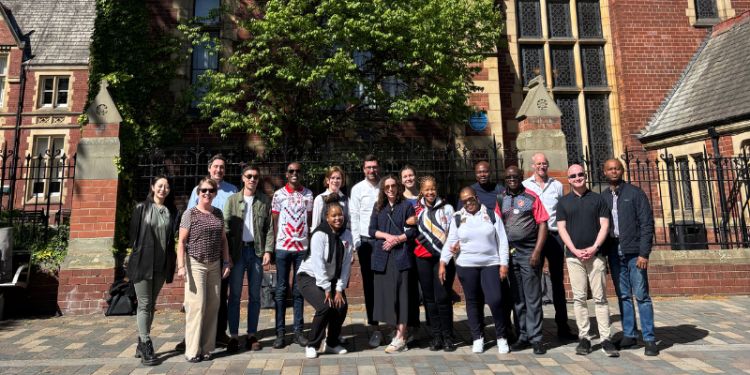Global voices on Just Transitions: Insights from the UK, Germany and South Africa

Workshop co-hosted by the School of Politics and International Studies addresses workers' experiences of just energy transitions.
On 13 May 2025, the Centre for Employment Relations, Innovation and Change (CERIC) and the School of Politics and International Studies hosted a workshop at the University of Leeds, that brought together academics and union representatives from Germany, South Africa and the UK.
The event, which was organised by Dr Alex Beresford, Professor Vera Trappmann, Dr Jo Cutter, and Dr Ruth Bookbinder, addressed workers’ experiences of just transitions to tackle the climate crisis (where the move to a low-carbon economy also protects communities’ rights and livelihoods) and was an opportunity to share insights from the different countries and lessons learned. As South Africa is also in the early stages of its energy transition, the workshop provided an important opportunity to build networks of solidarity with fellow trade unions.
The event, which was partially funded by the International Strategic Fund, was opened by Louise Heery, the Associate Director of Global Research Partnerships, who highlighted the importance of the social sciences in helping to ensure that transitions are just.
Professor Vera Trappmann (Leeds University Business School), then provided an overview of the 14-country, Hans Böckler Foundation funded project into trade unions’ responses to the climate crisis, which was the basis for the workshop.
The first session focused on summaries of the academic findings from some of the case studies, followed by reflections from union representatives with their key takeaways.
The second session considered ways forward and included presentations from Sam Perry, the Trade Union Congress (TUC)’s Green Bargaining lead, and Sarah Mewes from the Next Economy Lab (NELA), an organisation that runs educational programmes for trade union members in Germany.
During the lunch break, we screened a clip from the short film ‘Voices from the Transition’, which is based on field research in Chile and South Africa.
Although the countries are all at different stages of transitions - for instance, while South Africa is just embarking on its energy transition, debates and initiatives around just transitions are comparatively well-developed in Germany - there were several common strands across the case studies.
Firstly, the need to ensure procedural justices and include all stakeholders in plans for a post-transition economy. The German case study in particular showcases the value of thorough multiparty consultation and participation in planning for a post-coal future.
Felix Fleckenstein from the German Confederation of Trade Unions emphasised the need for workers to be “actors not objects” in transitions to protect workers and their communities’ interests. Reflections from delegates from South Africa and the UK on the devastating impacts of mine or power stations closures on mining and industrial towns when workers are “objects” underlined the importance of this point.
A second area of consensus was concern over privatisation in the energy sector. Representatives from all countries noted the impact that privatisation, such as in extending the grid, could have on the affordability of electricity while making it harder for governments to manage these developments.
Moreover, securing a just transition will require substantial investment – in Germany the Coal Commission received €70 billion to create new economic structures – and there was a general sense that the private sector is not a reliable source for this funding.
Similarly, delegates drew attention to the risk of a “cliff-edge” transition (one that is sudden and damaging) if jobs are not created in time in critical sectors, which they felt was more likely to occur if the government was not an active stakeholder.
Concerns about privatisation are also related to a sense that countries need to mitigate against excessive dependence on external countries for critical technologies. For instance, representatives from the UK and South Africa argued that it was important to develop national manufacturing capacity for renewable energy technologies, both as a new source of industrial development but also to preserve a degree of energy sovereignty.
The workshop served as a catalyst for future engagements between the delegates, with plans for future meetings in Germany and South Africa. It was also the first event of our South African delegates’ weeklong trip to the UK that included internal workshops and a panel at Chatham House in London.
The team hopes to establish a strategic partnership between trade unionists and academics from Germany, South Africa and the UK, that can help both with international collaborations and inform policy-making.
They are planning on conducting further research in these countries and are developing training materials on Just Transition for trade unions.
Visit the Just Transition project webpage for further information.
Information about the research project South Africa's 'just' energy transition is here.




